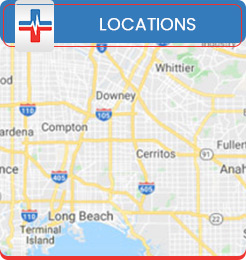Gastrointestinal Doctor Q&A
Gastrointestinal doctors treat all organs that are connected to the digestive system such as the Gastrointestinal tract and biliary organs. Certain medical conditions that the GI doctor treats are irritable bowel syndrome, stomach ulcers, celiac disease, abdominal pain, indigestion, and other disorders. Visit Reddy Urgent Care if you are having gastrointestinal discomfort issues. Our medical staff will help you relieve your symptoms by determining the cause of your condition and providing the appropriate treatment. For more information, contact us. We have convenient locations to serve you in Bixby Knolls Long Beach, Downtown Long Beach, and Paramount, CA.


Table of Contents:
What is gastrointestinal disease?
What Triggers Gastrointestinal Disease?
What are the most common signs and symptoms of gastrointestinal disorders?
What is the Difference Between a GI Doctor and a Gastroenterologist?
Research shows that approximately 11% of Americans suffer from some type of gastrointestinal (GI) issue, with the most common disorders being irritable bowel syndrome (IBS), acid reflux, indigestion, and hemorrhoids.
The gastrointestinal tract is made up of the different biological systems that are responsible for healthy digestion. When it runs smoothly, the GI tract can break down food into nutrients which can then be absorbed the body. However, when it’s affected by GI distress or disease, that process is disrupted, and digestion cannot happen properly.
If you’re experiencing temporary or chronic GI distress, our team at Reddy Urgent Care can help you get the answers and the treatment you’re looking for. Contact us today for more information about our gastrointestinal doctors or treatment options, or you can walk in at your earliest convenience to be seen by one of our GI specialists.
A gastrointestinal disease is an ailment that specifically affects one or more of the passageways that are responsible for breaking down and absorbing nutrients from food, or removing waste from the body. This system of passageways is known as the gastrointestinal (GI) tract and runs from the mouth to the anus.
There are two definitive categories that GI diseases fall into: (1) functional diseases and (2) structural diseases.
Functional diseases are characterized by a GI tract that looks normal when examined but doesn’t perform its biological responsibilities properly. These types of diseases are most common, including such ailments as constipation, IBS, nausea, bloating, gas, diarrhea, GERD, and food poisoning.
In contrast, structural GI diseases are characterized by disturbances to the GI tract that are visible upon examination and are causing the system to react abnormally. In some cases, surgery may be required to repair the part of the GI tract that is structurally unsound. The most common types of structural GI ailments are strictures, hemorrhoids, diverticular disease, colon polyps, inflammatory bowel disease, and colon cancer.
There are many different internal and external triggers that can cause upset in your GI tract and hinder it’s function. This includes:
– Aging.
– Certain medicines or supplements.
– Changes to your normal routine.
– Consuming foods that you have intolerance to (such as diary or gluten).
– Genetics.
– High levels of stress.
– Irregular bowel movement (sometimes caused by coinciding GI conditions).
– Not eating enough dietary fiber.
– Not exercising or moving your body enough.
– Overusing anti-diarrheal medications.
– Pregnancy.
– Taking antacid medicines that contain calcium or aluminum.
– Traveling.
– Undiagnosed allergies.
If you keep getting GI upset and aren’t sure what’s triggering it, it’s always best to consult your primary care physician or a GI specialist. They’ll be able to help you pinpoint the cause of your symptoms so that you can better manage and//or eliminate your symptoms moving forward.
The signs and symptoms associated with digestive disorders vary based on the specific condition and how your body responds to it. However, some of the most common symptoms indicating GI distress and/or disorders are:
– Abdominal pain
– Acid reflux (heartburn)
– Bloating
– Constipation
– Cramping
– Diarrhea
– Difficulty swallowing.
– Fatigue
– Incontinence
– Loss of appetite
– Nausea
– Unintentional weight loss
– Vomiting
GI symptoms can range in intensity, sometimes being very mild and other times very severe. While it’s normal to experience the occasional digestive upset, you should consult with your physician if your symptoms are persistent and/or severe. This is your body’s way of telling you that something is wrong – potentially indicating a more serious digestive condition.
Simply put, there is no difference between a gastroenterologist and a GI doctor – they are both titles that denote the same occupation.
Both terminologies refer to specialists that are highly educated and experienced when it comes to the digestive system. They hold specialization in the diagnosis, treatment, and prevention of digestive diseases and ailments.
There education is extensive, consisting of a 3-year residency in internal medicine, a 2–3-year fellowship in gastroenterology, and continuing education programs once their formal education is complete. Once they’ve completed their fellowship, they become eligible to take the gastroenterology board certification test from the American Board of Internal Medicine. If they successfully pass this test, they become board-certified – allowing them to practice on the general public.
At Reddy Urgent Care, we understand how disruptive GI distress can be to your day-to-day life. That’s why our professional team of medical specialists offer the highest level of care and treatment so that you can address and resolve these issues in an effective manner. For more information, contact us. We have convenient locations to serve you. We serve patients from Bixby Knolls Long Beach CA, Downtown Long Beach CA, Paramount CA, Lakewood CA, Rossmoor CA, Carson CA, Bellflower CA, Lynwood CA, Norwalk CA, and surrounding areas.
Check Out Our 5 Star Reviews






